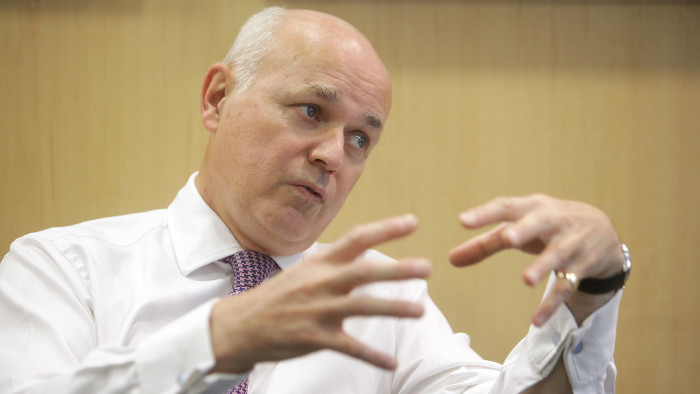Fallout grows over welfare failings

Roula Khalaf, Editor of the FT, selects her favourite stories in this weekly newsletter.
A senior civil servant is expected to pay the price for failings over the government’s flagship welfare reform, as Iain Duncan Smith fought back after excoriating criticism from the public spending watchdog.
Robert Devereux, permanent secretary at the department for work and pensions, is likely to leave his post after two years as the impact of the National Audit Office report on Universal Credit reverberated around Whitehall on Thursday.
In a series of interviews, and an appearance at the Commons dispatch box, the welfare secretary put the blame squarely on a “lack of professionalism” among civil servants and said he had “lost faith” in their ability to manage the programme.
The NAO report said the Universal Credit, which will roll six existing benefits into a single payment, had been blighted by “weak management, ineffective control and poor governance”.
People close to the situation said Whitehall was planning for the departure of Mr Devereux, although the timing of a leadership change was unclear. A person close to Mr Duncan Smith refused to comment on the permanent secretary’s future. Mr Devereux is expected to be called before the Public Accounts Committee to be questioned about the department’s performance.
Signs of unhappiness with Mr Devereux were evident when David Pitchford, a Whitehall troubleshooter, was drafted in to take charge of Universal Credit in February. He reported directly to Mr Duncan Smith, bypassing the permanent secretary.
The problems at DWP will intensify scrutiny of the civil service, which has faced questions over its ability to manage complex reforms and procurement projects at a time of heavy budget cuts across Whitehall.
In a report published on Friday, the Commons Public Administration Select Committee, urged that a parliamentary commission on the future of the civil service be created.
The committee, led by Bernard Jenkin, a Tory MP, noted that the “[Whitehall] culture promotes the filtering of honest and complete assessments to ministers and is the antithesis of ‘truth to power’.”
The report, drafted before the revelations about Universal Credit, found there was “a failure to learn from mistakes and instead a tendency to look for individuals to blame”.
Government figures rallied around Mr Duncan Smith on Thursday as Downing Street officials insisted the prime minister had no intention of moving Mr Duncan Smith in any upcoming reshuffle. He had acted to get UC back on track, rather than “ploughing on for political reasons,” they argued.
However, Mr Duncan Smith faced a backlash from civil servants’ leaders and others who have worked in Whitehall. The FDA, which represents senior civil servants, said Mr Duncan Smith’s comments represented “a growing blame culture in government where ministers blame civil servants but fail to take any responsibility when things go wrong or overrun”.
A former senior civil servant, who has also worked extensively in the private sector, said that, in contrast to the corporate world, where a chief executive would announce a strategy shift and a writedown without embarrassment, the culture inside Whitehall made it hard for officials to take bad news to ministers.
A partner at a major accountancy firm, which has worked with government departments, also criticised the way the government engaged with civil servants. “The whole ethos of communication was, don’t tell us any bad news,” said the person. “They are far more aggressive with the civil servants, far more dictatorial.”
Comments